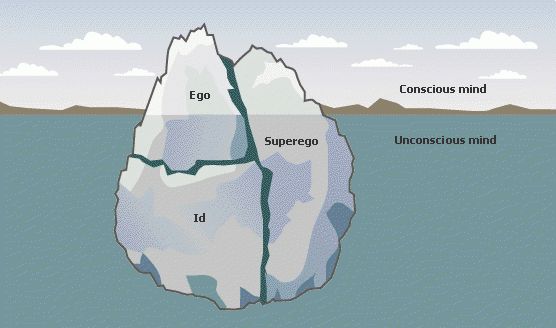Ego , Id , Superego
May 25, 2019 • 87 views
Significant contribution of Sigmund Freud (ego, id, superego)
Freud believed that when we explain our own behavior to ourselves or others (conscious mental activity) we rarely give a true account of our motivation. This is not because we are deliberately lying. Freud developed atopographical modelof the mind, whereby he described the features of the mind’s structure and function. Freud used the analogy of an iceberg to describe the three levels of the mind.
On the surface is consciousness, which consists of those thoughts that are the focus of our attention now, and this is seen as the tip of the iceberg. The second part, preconscious consists of all which can be retrieved from memory. The third and most significant region is the unconscious. Here lie the processes that are the real cause of most behavior. Like an iceberg, the most important part of the mind is the part you cannot see.

The id is the primitive and instinctive component of personality. It consists of all the inherited (i.e. biological) components of personality present at birth, including the sex (life) instinct – Eros (which contains the libido), and the aggressive (death) instinct - Thanatos.
The id is the impulsive (and unconscious) part of our psyche which responds directly and immediately to the instincts. The personality of the newborn child is all id and only later does it develop an ego and super-ego.
The id remains infantile in its function throughout a person’s life, and does not change with time or experience, as it is not in touch with the external world. The id is not affected by reality, logic or the everyday world, as it operates within the unconscious part of the mind. The id operates on the pleasure principle (Freud, 1920) which is the idea that every wishful impulse should be satisfied immediately, regardless of the consequences. When the id achieves its demands, we experience pleasure, when it is denied we experience ‘non-pleasure’ or tension. The id engages in primary process thinking, which is primitive, illogical, irrational, and fantasy oriented. This form of process thinking has no comprehension of objective reality, and is selfish and wishful in nature.
The ego is 'that part of the id which has been modified by the direct influence of the external world. ‘The ego develops in order to mediate between the unrealistic id and the external real world. It is the decision-making component of personality. Ideally the ego works by reason, whereas the id is chaotic and totally unreasonable. The ego operates according to the reality principle, working out realistic ways of satisfying the id’s demands, often compromising or postponing satisfaction to avoid negative consequences of society.
The ego considers social realities and norms, etiquette and rules in deciding how to behave. Like the id, the ego seeks pleasure (i.e. tension reduction) and avoids pain, but unlike the id the ego is concerned with devising a realistic strategy to obtain pleasure. The ego has no concept of right or wrong; something is good simply if it achieves its end of satisfying without causing harm to itself or to the id. Often the ego is weak relative to the headstrong id and the best the ego can do is stay on, pointing the id in the right direction and claiming some credit at the end as if the action were its own.
The superego incorporates the values and morals of society which are learned from one's parents and others. It develops around the age of 3 – 5 during the phallic stage of psychosexual development. The superego's function is to control the id's impulses, especially those which society forbids, such as sex and aggression. It also has the function of persuading the ego to turn to moralistic goals rather than simply realistic ones and to strive for perfection. The superego consists of two systems: The conscience and the ideal self. The conscience can punish the ego through causing feelings of guilt. For example, if the ego gives in to the id's demands, the superego may make the person feel bad through guilt.
The ego can deploy variousdefense mechanisms(Freud, 1894, 1896) to prevent it from becoming overwhelmed by anxiety.
